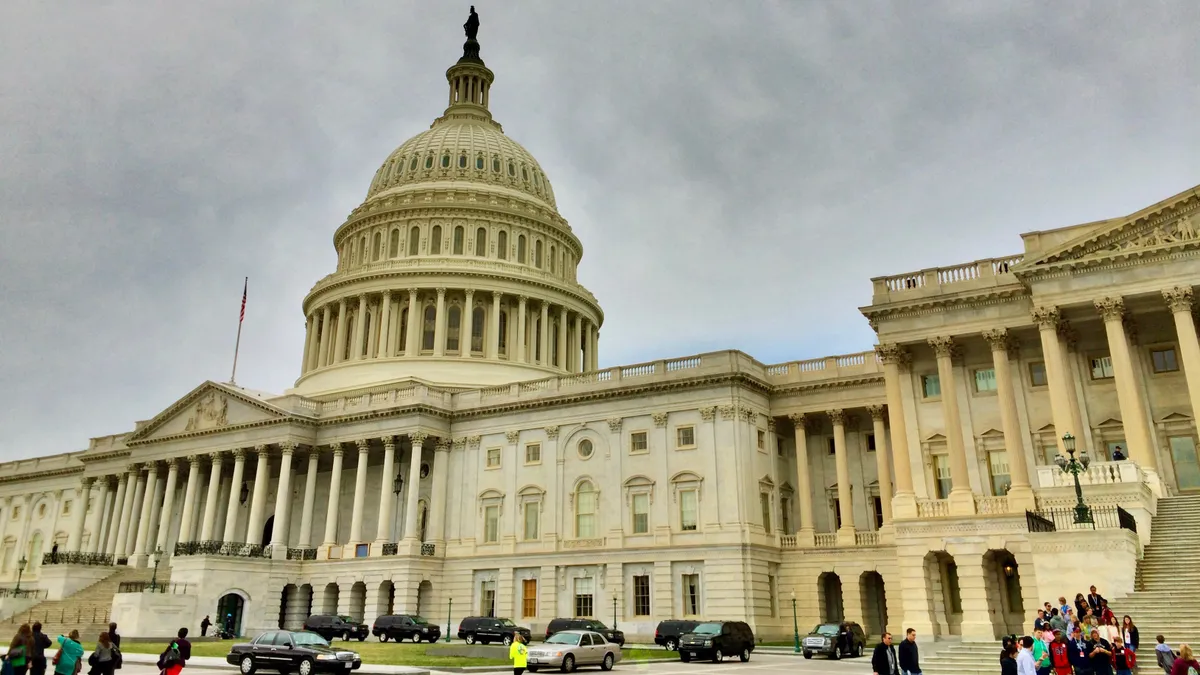Dive Brief:
- In a pair of unrelated letters to Congressional leaders, lawmakers, companies and business groups on Tuesday urged federal support for the clean energy industry, which has lost an estimated 600,000 jobs due to the COVID-19 pandemic.
- Dozens of Democratic Senators and Representatives are calling for "additional flexibility" for energy tax credits in order to "rebuild the clean energy sector and workforce." Led by Sen. Martin Heinrich, D-N.M., the lawmakers say the clean energy sector has seen a 17.4% decline in employment — outstripping the April national unemployment rate of 14.7%.
- In addition, about 80 companies and organizations, led by the Alliance to Save Energy (ASE), National Association of Energy Service Companies, National Association of State Energy Officials, the Federal Performance Contracting Coalition and others, have proposed federal appropriations of $22 billion over five years to retrofit critical public facilities. They say the federal funding could help leverage an estimated private investment of $88 billion to deliver a total of $110 billion in economic activity.
Dive Insight:
Dozens of companies and business groups have sketched out a federal investment plan they say will not only put people back to work in the construction, engineering and manufacturing sectors, but will also help the country prepare for future disasters.
"This should be a natural fit for any kind of infrastructure package that Congress takes up," ASE Vice President of Public Affairs Ben Evans told Utility Dive in an email.
The groups have proposed $18 billion for state and local public buildings, including grade schools, universities and colleges and health care buildings, to be provided through the federal State Energy Program over five years. The program, run by the U.S. Department of Energy, provides funding and technical assistance to states to improve energy security and decrease energy waste.
Other proposed funding approaches include $2.5 billion for improvements to federal buildings through the Federal Energy Efficiency Fund and $1.5 billion for energy efficiency improvements in public housing. Some funding would also be made available through the U.S. Departments of Army, Navy, and Air Force, U.S. Department of Veterans Affairs and the General Services Administration.
The funding could go toward a range of efficiency and resilience measures, including making windows storm resistant, upgrading HVAC controls so that they can interact with the utility grid, or the development of microgrids.
"This pandemic has demonstrated clearly that we need to be better prepared with modernized public buildings, and this proposal would accomplish that through public-private partnerships that require limited public investment," Evans said. "It would also go a long way toward creating jobs for the more than 400,000 energy efficiency workers who have lost their jobs since March."
Organizations signed on to the ASE-led letter include: ConEdison Solutions, Constellation, DuPont Specialty Products USA, FPL Energy Services, Greentech Energy, Schneider Electric, Siemens Corporation USA, and the Sheet Metal and Air Conditioning Contractors National Association.
In a separate letter, almost 60 lawmakers warned Senate and House leadership that the COVID-19 pandemic and resulting economic crisis are "devastating the clean energy workforce and sector." They urged Congress to prioritize a clean energy recovery plan in upcoming economic relief and recovery packages.
The lawmakers say recent estimates have found that the clean energy sector will have lost approximately 850,000 jobs, or about a quarter of its workforce, by the end of the second quarter this year "if no actions are taken to support the workforce and industry."
"As Congress works to help the American economy recover, we must ensure robust investments are made to spur growth in renewable energy, energy storage, energy efficiency, clean vehicles, clean and efficient infrastructure, clean fuels, and workforce development," the lawmakers wrote.
According to the letter, approximately 594,300 clean energy workers have lost their jobs during the pandemic and others have been furloughed or are underemployed.
"These clean energy jobs losses also represent more than double the past 3 years of industry-wide clean energy employment growth," they said. "The number of the existing clean energy tax incentives for individuals and businesses are phasing down or expiring. Extending and providing additional flexibility for these credits, which spur production and save money for consumers, is another important facet of a quick recovery."















